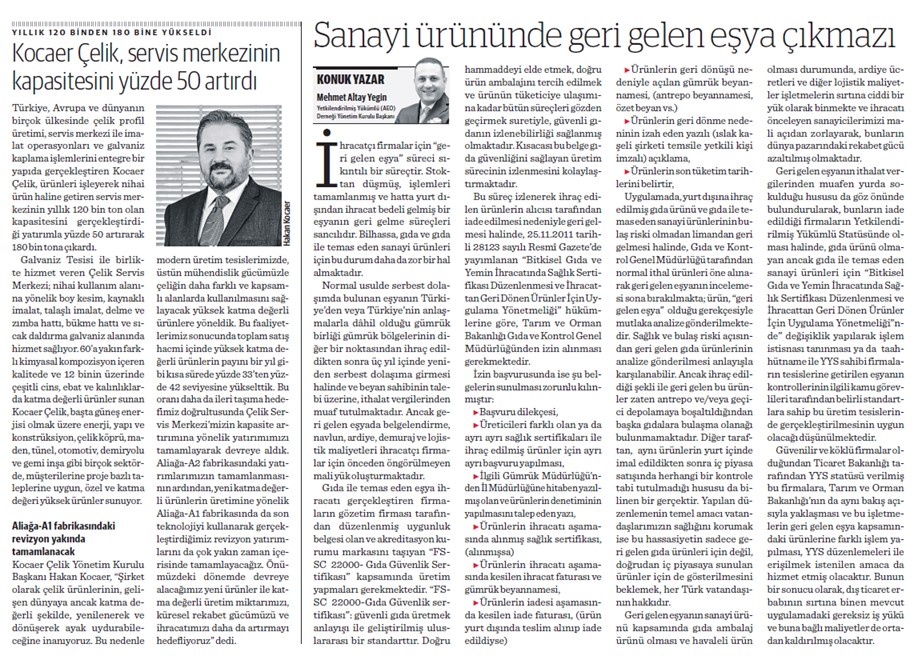Our Chairman of the Board of Directors, Mehmet Altay YEGIN, wrote an article titled "The Deadlock of Returned Goods in Industrial Products" that was published in “Nasıl Bir Ekonomi” newspaper.

The "returned goods" process is troublesome for exporters. Returning an item that has fallen out of stock, whose transactions have been completed, and even the export price has been received from abroad, is painful. This situation becomes even more difficult for food and industrial products in contact with food.
Goods in free circulation in the standard procedure are exempt from import duties if they are re-entered into free circulation within three years after they are exported from Türkiye or from another point of the customs union customs zones to which Türkiye is included by agreements and upon the request of the declarant. However, the costs of documentation, freight, warehousing, demurrage, and logistics for returned goods create an unforeseen financial burden for exporters.
Companies that export goods in contact with food must produce within the scope of the "FSSC 22000-Food Safety Certificate", a certificate of conformity issued by the surveillance company and carries the brand of the accreditation institution. "FSSC 22000-Food Safety Certificate" is an international standard developed to produce safe food. The traceability of safe food is ensured by obtaining suitable raw materials, choosing the proper product packaging, and reviewing all processes until the product reaches the consumer. In short, this document facilitates monitoring the production process that ensures food safety.
If the buyer returns the products exported following this process, it is necessary to obtain permission from the General Directorate of Food and Control of the Ministry of Agriculture and Forestry by the provisions of the "Regulation on the Issuance of Health Certificate in the Export of Herbal Food and Feed and Implementation for Products Returned from Export" published in the Official Newspaper dated 25.11.2011 and numbered 28123. The following documents must be submitted in the permit application:
* Application petition,
* Separate applications for products with different manufacturers or exported with separate health certificates,
* A letter addressed to the Provincial Directorate from the relevant Customs Directorate requesting the inspection of the products,
* Health certificate obtained during the export of products (if received)
* Export invoice and customs declaration issued during the export of the products,
* Return invoice issued during the return of the products (if the product was received and returned abroad)
* A customs declaration (warehouse declaration, summary declaration, etc.) was opened due to the return of the products.
* Written explanation (signed by the person authorized to represent the company with a wet stamp) explaining the reason for the return of the products,
* Indicates the expiry dates of the products,
In practice, if food products and industrial products in contact with food exported abroad come back from the port without any risk of contamination, the General Directorate of Food and Control prioritizes everyday import products and leaves the examination of the returned goods to the end; the product is sent for analysis on the grounds that it is "returned goods." Regarding health and contamination risk, it is understandable that returned food products are sent for analysis. However, since these products that come back in the form they were exported have already been unloaded into warehouses and temporary storage, there is no possibility of contamination of other foods. On the other hand, it is a known fact that the same products are not subject to any control in the domestic market after they are manufactured domestically. Suppose the regulation's primary purpose is to protect our citizens' health. In that case, it is the right of every Turkish citizen to expect this sensitivity to be shown not only for returned food products but also for products offered directly to the domestic market.
If the returned goods are food packaging products within the scope of industrial products and are remittance products, warehousing fees, and other logistics costs are a serious burden on the backs of the enterprises. These costs reduce their competitiveness in the world market by financially straining our industrialists, who prioritize exports.
Because the returned goods are brought into the country exempt from import taxes, if the companies to which they are returned have Authorized Economic Operator Status, it is thought that it would be appropriate to grant a transaction exemption for industrial products that are not food products but come into contact with food by amending the "Regulation on the Issuance of Health Certificates in the Export of Herbal Food and Feed and Implementation Regulation for Products Returned from Export" or to carry out the controls of the goods brought to the facilities of the YYS owner companies with a letter of commitment by the relevant public officials in these production facilities with specific standards.
The Ministry of Agriculture and Forestry's approach to these companies, which the Ministry of Trade has granted YYS status because they are reliable and well-established companies, and the Ministry of Agriculture and Forestry's approach to these companies with the same perspective and the different treatment of their products within the scope of returned goods will also serve the purpose intended to be achieved with the YYS regulations. As a result, the unnecessary workload and related costs in the current practice, which are on the backs of foreign traders, will also be eliminated.
